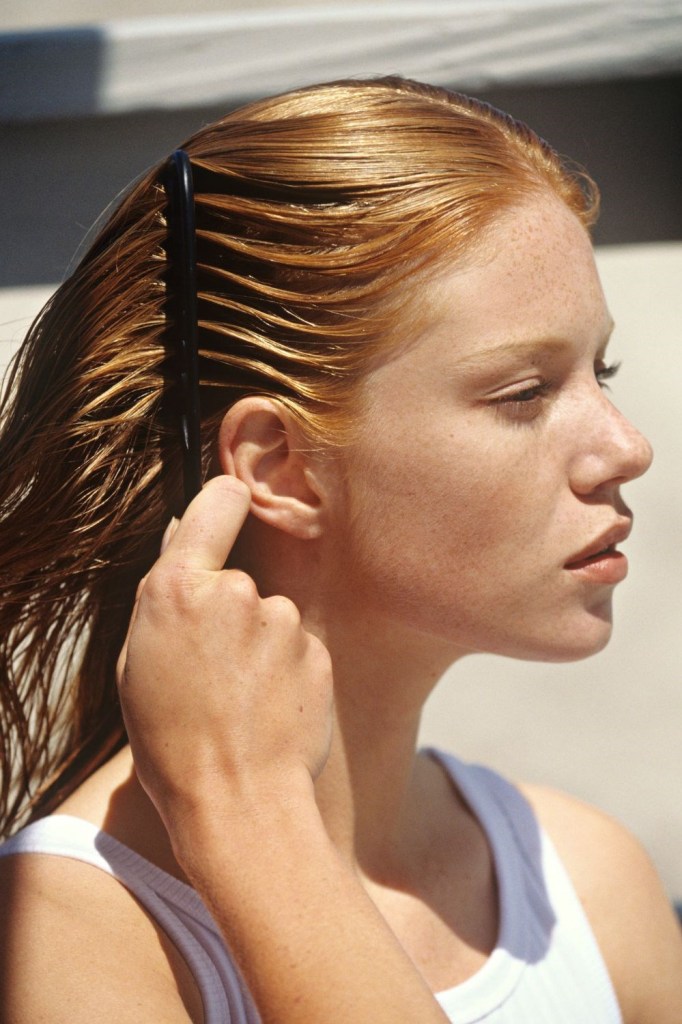We’ve all done it. A late night hair wash that leaves you so exhausted you can’t help but skip the blow dryer and fall straight into bed.
But have you ever wondered what happens to your locks when left to dry during your sleep?
From stressed strands to scalp fungus, the internet is full of horror stories when it comes to sleeping with wet hair.
So to separate fact from fiction, we reached out to the experts. Below, what you really need to know about sleeping with wet hair.

Does Sleeping With Wet Hair Mean You’re More Prone To Breakage?
If you’re noticing more split ends or breakage amongst your strands, sleeping with wet hair actually could be the cause.
UNSW dermatologist professor Deshan Sebratnam told marie claire Australia, “When your hair is wet, there are changes to the structure of the strand on a molecular level. It is slightly weaker and predisposed to breakage.”
So, if you frequently toss and turn in your sleep, the friction of wet hair against your pillow could lead to increased breakage.
However, if you follow up your hair wash with a conditioner, trichologist Chelsey Salinger says you’re likely in the clear, whether your hair is wet or not by the time you go to sleep.
“If hair is wet from water, the pH of the water on the hair will weaken the hair slightly, while also opening the cuticle scales slightly. So the hair might be more prone to tangle” she explained.
“But, if a conditioning rinse of pH 5.5 has been used, the hair’s cuticle will be at its most compact” – so no cause for concern here.

Is Sleeping With Wet Hair Bad For Your Scalp?
According to Washington-based board-certified dermatologist Noelle Sherber, the effects of sleeping with wet hair are more than root-deep.
“Certain bacteria and fungi thrive in warm, moist environments and so will proliferate on scalp skin if it stays damp for hours,” she told Allure.
“Most commonly, a type of yeast called Malassezia can accumulate on the scalp and cause flaking, which can be mistaken for dandruff.”
Salinger, on the other hand, is a little more wary of this theory.
“If the scalp is wet from water, the higher pH will encourage the growth of yeast and bacteria, which could lead to dandruff and itchiness,” she explained.
“But if regular hair washing is followed with a conditioning rinse, the pH should be at about 5.5, which keeps the microorganisms in check.”
Sebratnam backed up this claim, telling us that there are no well documented impacts of going to bed with wet hair on the scalp.

How can you protect your hair and scalp while sleeping?
While it seems the risks of going to sleep with wet hair are minimal, it still pays to be prepared. To give our scalp and strands the best fighting chance, we consulted creative director of famed salon Koda Cutters, Diane Gorgievski, for her tips and tricks to the healthiest sleep habits.
Fine, coloured hair is most vulnerable to sleep-related damage, she explained, so you should establish a sleep pattern and sleep habits that won’t further damage the condition.
Hair brushing before sleep is one way she suggests to do this – “it exfoliates and invigorates the scalp” she explains.
“Silk pillow cases are another great way to improve your hair condition” because they reduce friction and, in turn, tangles and breakage.
Products To Improve Your Hair Health

Slip Queen Silk Pillowcase With Invisible Zipper, $95 from The Iconic.

GHD Air Hair Dryer, $250 from Sephora

STRAAND Scalp Brush, $19.95 from Adore Beauty.

Coco & Eve Microfibre Towel Wrap, $34.90 from Adore Beauty.




